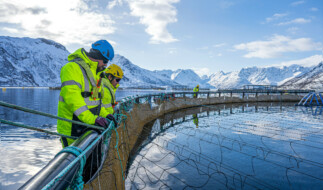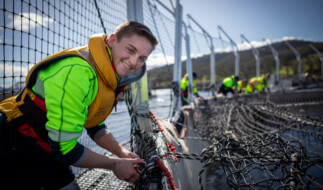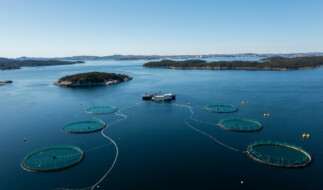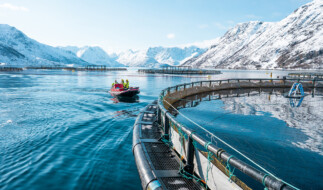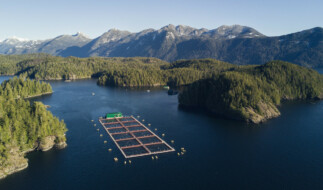How can private sector help drive food systems transformation? Aquaculture shows what's possible
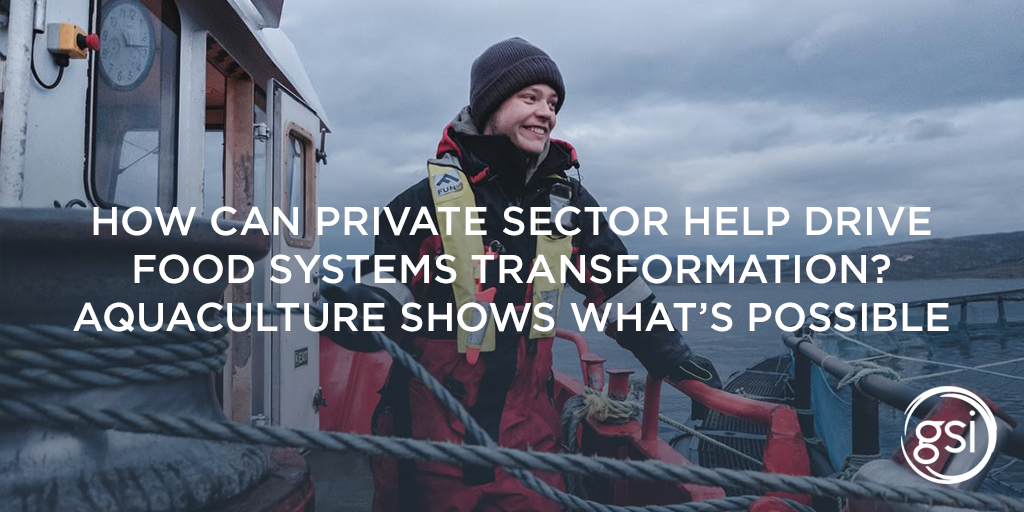
Today’s global food systems face unprecedented challenges, and at the same time, offer countless opportunities to drive widescale health, social and environmental progress. This is September’s United Nations (UN) Food Systems Summit (Summit) is expected to seize on these opportunities. It aims to forge a bold new path to achieve the Sustainable Development Goals (SDGs), using food as a catalyst. By identifying game-changing solutions for food systems transformation and uniting millions of people around the world acting in their own countries and communities, the Summit could inform national food policies, programs and priorities for years to come.
Why it’s Important to Engage in the Food Systems Summit Dialogues (FSSD)
Within the Global Salmon Initiative (GSI) we have seen first-hand the game-changing ideas and solutions that can come from collective thinking and sharing of experiences. With successful mobilization of the private sector and effective public-private partnerships there are clear examples of how we can accelerate the uptake of new ways of working. Aquaculture is the world’s fastest growing food sector and will play an important role in supporting healthy, affordable and sustainable diets. As part of this recent growth, the sector has been through a significant journey of learnings and adaptations to meet demand in a responsible way. Which is why, together with the World Wildlife Fund (WWF), GSI hosted a virtual FSSD on April 20, 2021, Mobilizing food system change with private sector leadership: lessons from aquaculture, to share these learnings and insights with the Summit and other sectors.
Gathering Experts to Identify Aquaculture’s Lessons Learned
Over 30 scientists, private sector executives, non-governmental organization representatives, investors and more gathered at GSI and WWF’s FSSD. Participants spanned Europe, Australia and the United States, and represented thought-leading institutions, including FAIRR, World Resources Institute, Blue Foods Assessment, UN Global Compact, the Stockholm Resilience Center and more. The FSSD provided a unique forum for these experts to discuss, debate and ultimately identify best practices and learnings from aquaculture.
Presentations from the following leaders set the stage for the small group discussions, which focused on: 1) Sustainable finance, 2) Transparency & sustainability certifications and 3) Feed innovations – three areas where aquaculture has had success in driving industry-wide sustainability change.
- Sophie Ryan, CEO of GSI, spoke about GSI’s change model and environmental improvements for more responsible salmon farming
- José Villalón, Corporate Sustainability Director at Nutreco, counseled on finding common ground for collective ocean action
- Kristina Furnes, Global Communications Manager at Grieg Seafood, reflected on the power and potential of feed innovations
- Jason Clay, Senior Vice President, Markets at WWF, presented on why GSI’s model has worked and what it could mean for other protein sectors
Highlights from the FSSD conversation are below, but a detailed summary is available in this Official Feedback Form, which was submitted to Summit organizers.
Identifying Best Practices from Aquaculture: Key Learnings from the FSSD
Based on aquaculture’s experience, participants believed there is high potential for private sector to:
1. Explore potential for pre-competitive platforms – There are many examples within aquaculture of these working very well, GSI being one. Such platforms have demonstrated the ability to save time and resources, drive faster progress and facilitate knowledge sharing. Better communicating the value of these platforms to industry stakeholders and ensuring producers of all sizes – particularly smaller farms – had a seat at the table could help fully realize pre-competitive platforms’ potential.
2. Embrace transparency – It is essential for private sector to be transparent about environmental goals and progress made. Not meeting a goal should open the doors to honest reflections and different approaches, and through transparency and open dialogue there is opportunity for new solutions.
3. Motivate progress with sustainable financing – More investors are integrating environmental, social and corporate governance into financial decision-making, which could encourage innovation. Quality regulatory frameworks and clear key performance indicators to support best practices and reflect trade-offs could help strengthen this space.
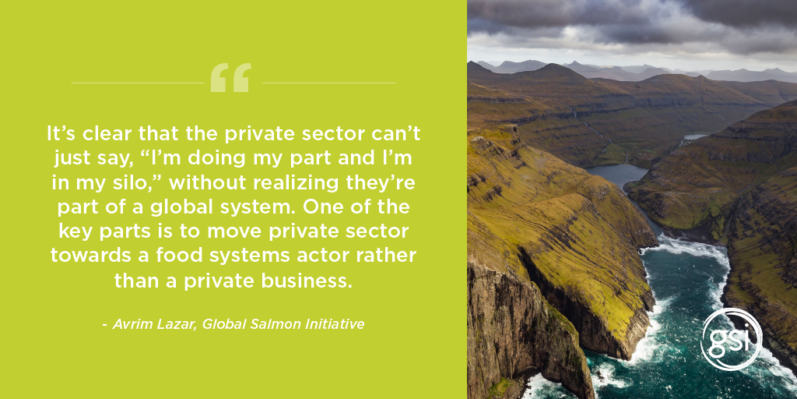
4. Recognize success doesn’t happen in silos – Private sector’s environmental efforts must happen alongside science-based regulations, and across the supply chain. Additionally, companies’ environmental and social sustainability work must be cross-cutting company priorities, not the responsibility of a single division.
5. Harness private sector’s differentiators: a sense of speed and competition – There is great potential in harnessing the competitive edge of the private sector to motivate and accelerate environmental innovations. environmental innovations.
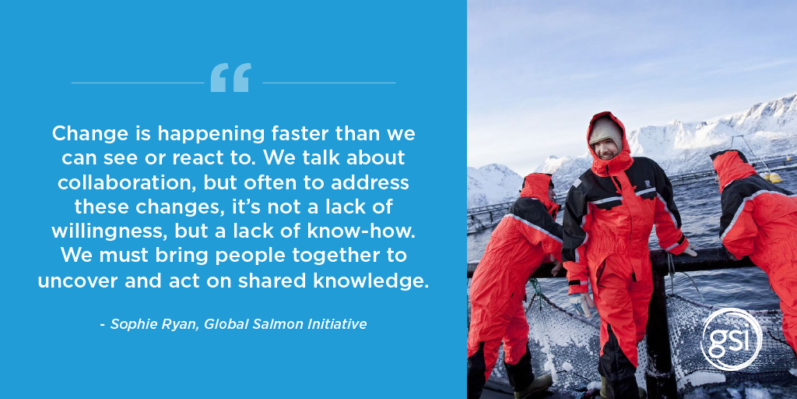
6. Engage in public-private partnerships – These engagements are considered important, but also high risk for not delivering on promised outcomes. Clearer guidance and accountability measures, especially when dealing with emerging technologies and sectors, could help mitigate this risk.
7. Adopt and improve sustainability certifications – Certifications like Aquaculture Stewardship Council can help public and private sector stakeholders understand and work towards nature-based solutions (vs. not just minimize negative impacts), inform investments and manage risk. They're one of many important tools for accountability and transparency, and could continue to be improved through more oversight mechanisms, like third-party audits.
8. Innovate for change – The private sector is often at the forefront of innovation, recognizing industry needs and having capacity to trial new approaches. With better engagement across both public and private sectors this can be utilized to deliver innovations at a faster rate alongside suitable regulations.
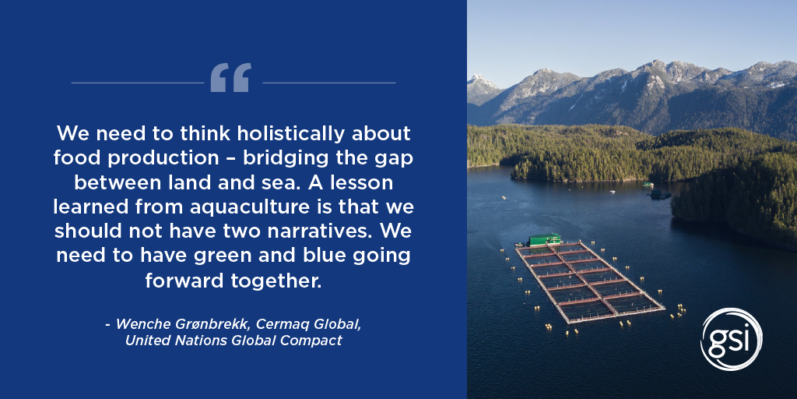
GSI’s Change Model Shows What’s Possible
Because many participants had experience working with GSI, its model of knowledge sharing, transparency and innovation for environmental improvement was considered a blueprint to replicate across other sectors. GSI successfully uses the critical mass of industry to:
- Set ambitious goals based on where the need is greatest
- Create dedicated expert task forces to share best practices and problem solve
- Report transparently and regularly on progress made, like in its latest Sustainability Report.
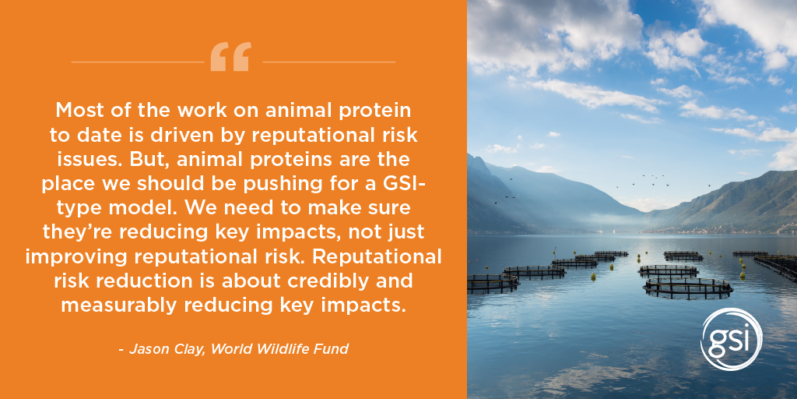
Now is the Time to Engage
Through forums like FSSDs, GSI is working to ensure blue foods' potential is fully recognized in the future of sustainable nutrition and food systems at the Summit and beyond. Whether providing comment on the Summit action track recommendations, joining FSSDs, or engaging in the online community forum, there is no shortage of opportunities for other aquaculture leaders to have a voice in this movement.
There is a tremendous and essential role for the private sector - including the aquaculture sector - to support healthier diets, responsible production practices and more equitable outcomes for all. Now is the time to engage, to make clear the role that sustainable seafood can play in supporting the SDGs and work each day to deliver progress.
